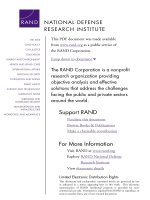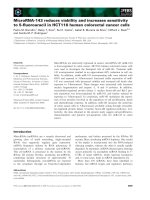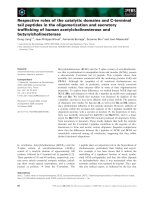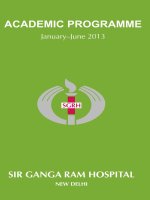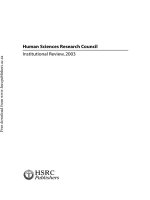Human Sciences Research Council pot
Bạn đang xem bản rút gọn của tài liệu. Xem và tải ngay bản đầy đủ của tài liệu tại đây (805.62 KB, 156 trang )
Human Sciences Research Council
Institutional Review, 2003
Free
d
own
l
oa
d
f
rom www.
h
srcpu
bli
s
h
ers.ac.za
HSRC Institutional Review, 2003
Published by Human Sciences Research Council Publishers
Private Bag X9182, Cape Town, South Africa
© Human Sciences Research Council 2003
First published 2003 ISBN 0 7969 2057 5
All rights reserved. No part of this book may be reprinted or reproduced or utilised in any form
or by any electronic, mechanical, or other means, including photocopying and recording, or in
any information storage or retrieval system, without permission in writing from the publishers
Production by comPress
Distributed in South Africa by Blue Weaver Marketing and Distribution, PO Box 30370, Tokai,
Cape Town, South Africa, 7966. Tel/Fax: (021) 701-7302, email:
Free
d
own
l
oa
d
f
rom www.
h
srcpu
bli
s
h
ers.ac.za
Table of Contents
Foreword by the Council of the HSRC vii
Report of the Review Panel 1
Preface by the Chairperson of the Review Panel 3
Executive Summary of the Report of the Review Panel 6
1 Introduction 26
Terms of reference 26
Modus operandi 27
Members of the Review Panel 28
Acknowledgements 30
2 An overview of the current context 32
Political and social context 32
Constitutional stability 32
Social phenomena 32
Regional and international affairs 34
Public administration 35
Policy context 36
The Human Sciences Research Act, 1968 (Act 23 of 1968) 36
Public Finance Management Act (PFMA), 1999 (Act 1 of 1999) 37
White Paper on Science and Technology, 1996 37
Report of the 1997 HSRC Review Panel 37
South Africa’s National Research and Development (R&D)
Strategy, August 2002 38
Free
d
own
l
oa
d
f
rom www.
h
srcpu
bli
s
h
ers.ac.za
Three phases of HSRC transformation 39
Early implementation (1997–2000) 40
Transition towards the COUPE strategy (2000–2002) 40
Implementation of the COUPE strategy (2002–present) 41
The HSRC’s peer group 42
3 Stakeholder views of the HSRC 45
Definition of stakeholder 45
External stakeholders 46
The HSRC and the higher education community 48
Some criticisms of research quality 50
The HSRC’s public role 51
Internal stakeholders 52
Conclusion 55
4 The HSRC today 56
The 1997 review: overall perspective 56
New model HSRC 57
The HSRC’s new programme model 58
Programme transformation: addressing national
development priorities 60
Setting research priorities 60
A note on gender as a cross-cutting theme in programme
design 61
The quality of research outputs 63
Improving research impact 65
Transformation in funding 67
The 1997 Review 67
The funding model and the positioning of the HSRC 71
Parliamentary funding in the longer term 72
Transformation of researchers and research organisation 73
Transformation of institutional culture 76
Free
d
own
l
oa
d
f
rom www.
h
srcpu
bli
s
h
ers.ac.za
HSRC mandate and governance structures 76
Executive leadership and strategic management 77
Bridging the researcher-administration divide 77
Internal capacity development 79
Transformation of the organisation 80
Equity: race and gender 80
Gender updated 82
Post-2002 corporate services reconstruction process 83
The staff union 85
Conclusion 86
5 Collaboration, linkages and networking 87
Science councils and higher education institutions 87
The practice of collaboration, linkages and networking 90
Key factors for successful linkages and pitfalls to avoid 94
6 The HSRC’s public purposes 96
Why the HSRC needs to formulate its public purposes 96
Five public purposes for the HSRC 97
Implications of the proposed public purposes 98
The policy-relevant research purpose 99
The policy information purpose 101
The research stimulator purpose 101
The support to disadvantaged people purpose 101
The data set management purpose 102
The self-image of the HSRC 104
The HSRC’s engagement with Africa 107
A new name and legislation for the HSRC 110
The HSRC’s access to public funding 113
7 Conclusions and major recommendations 115
Conclusions 115
Major recommendations 118
Free
d
own
l
oa
d
f
rom www.
h
srcpu
bli
s
h
ers.ac.za
Annexures
A Terms of reference for the Review 120
B Final programme for the Review 126
C Review Panel support staff 130
D List of persons consulted 131
E National social science research institutions in other
countries 135
Notes 141
Acronyms 143
Figures
1 Research Programmes and national priorities 59
2 Research autonomy related to funding sources 71
Tables
1 HSRC funding sources and research income per head,
1996/97–2002/03 (R’000) 68
2 Projects by size, 2002–03 69
3 Projects by funding source and relative average size,
2002–03 70
4 Implications for the HSRC of the five public purposes 114
Free
d
own
l
oa
d
f
rom www.
h
srcpu
bli
s
h
ers.ac.za
Foreword
by the Council of the HSRC
The Council of the HSRC expresses its appreciation to the members of the
Panel whom it engaged to conduct the 2003 Review of the HSRC. In a
limited time the Panel considered a wealth of material and presentations,
and produced a substantial and thought-provoking final Report. It
provides much food for thought regarding the HSRC's functioning, the
extent of our transformation and future directions and challenges.
We are gratified by the Reports’s overall recognition that "the HSRC of
2003 is a different and much better organisation in important respects
than the HSRC of 1997. It has earned the respect given to it by the bulk
of its collaborators and stakeholders by the breadth, quality and
relevance of its contributions to the study and practice of social
development in South Africa."
The Report identifies important challenges and makes far-reaching
recommendations. The Council readily accepts many of them: for
example initiating networks with counterpart agencies,especially in the
rest of Africa; enhancing stakeholder involvement in formulating our
research agenda and designs;extending peer review of our outputs and
monitoring their impact; improving the management of our relations
with our research users; better co-ordinating our decentralised
capacity-development efforts; heightening our attention to gender
(and other discriminatory differentia); clarifying the disposition of our
Parliamentary grant; providing upgraded corporate services and
VII
Free
d
own
l
oa
d
f
rom www.
h
srcpu
bli
s
h
ers.ac.za
VIII
HSRC Institutional Review, 2003
systems to support research across our multiple centres; and develop-
ing and implementing a systematic communications strategy.
In some instances,however, the Council differs on the emphasis or the
substance of the conclusions drawn or proposals made by the Panel. In
others,further research or consultation will be required.However, even in
these instances the Review process has generated constructive debate.
Our considered views in these respects are as follows.
HSRC functions, relationships and programmes
An important issue during the Review was the balance between two key
functions in the HSRC's mandate, namely undertaking policy-relevant
social-scientific research of public benefit, and managing collaborative
networks among research institutions to undertake such research. The
Council appreciates the Panel’s endorsement of the numerous powerful
collaborative research networks that the HSRC already has underway.
While we agree that this mode of operation can be extended, and
replicated in other areas, we affirm that this networking is not separable
from, nor should it outweigh, the HSRC's continuing responsibly to
undertake policy-relevant social science in the public interest.
A related issue is the interaction between the HSRC and higher
education institutions (HEIs).The Panel usefully stresses the importance
of maximising collaboration rather than competition, in both the
pursuit of research opportunities and the deployment of the country's
scarce supply of skilled researchers.The successful transformation of the
HSRC into a respected and responsive participant in the research arena
has understandably caused tension in some of these relationships,
which was referred to by some of the Panel's interviewees.However, the
Council feels that positive engagements that have been achieved with
HEIs in many respects should not be underestimated.
Thus,a majority of HSRC research projects are now undertaken jointly
with other institutions, mainly HEIs, both in South Africa and abroad,
with sharing of the research income generated; senior HSRC staff
members are encouraged to set up part-time academic appointments,
especially involving graduate teaching and supervision; some HSRC
staff members and all the research interns are registered for
Free
d
own
l
oa
d
f
rom www.
h
srcpu
bli
s
h
ers.ac.za
postgraduate degrees at universities;and there are a significant number
of joint publications.
At the same time, we look forward to extending and institutionalising
these areas of engagement with the HEIs, and considering innovative
ways of co-operating.The same applies to HSRC collaborations with the
research functions of non-governmental and community-based
organisations, government departments, and other science councils,
and in particular the Africa Institute.
In responding to user needs,a related balance to be struck is between
smaller, discrete projects, which are often undertaken to tight deadlines
by the HSRC itself; and larger projects, linked into coherent, multi-year
research programmes concerned with national development
challenges, which are usually undertaken in collaboration with other
institutions. The Council notes that much of the HSRC's work is already
focussed on the latter, and welcomes the recommendation that this
emphasis should be even further increased. But it does not share the
Panel's anxiety about the HSRC also undertaking smaller projects, and
notes that most of these are responses to the urgent requests or
tenders of public-sector users, for which the HSRC's flexible and
dedicated research-capacity and national coverage are well suited.
Legislation and policy
One of the important challenges facing the new Council of the HSRC
during its term of office will be the drafting of a new HSRC Act. The
Panel proposes five "public purposes" for the HSRC, as the basis for
justifying partial funding by Parliamentary grant, to be considered for
inclusion in the legislation. The Council accepts the substance of the
first four of these: in essence, to conduct and foster development-
oriented policy-relevant social science; to advance the policy relevance
of its research through dissemination; to foster capacity-building and
collaborations in the science system; and to meet the social-scientific
research needs of disadvantaged communities.
But the Council would be reluctant to accept the fifth recommen-
dation without considerable further investigation.This proposes for the
HSRC the role of making data sets public, with due regard for
Foreword by the Council of the HSRC
ix
Free
d
own
l
oa
d
f
rom www.
h
srcpu
bli
s
h
ers.ac.za
intellectual property, and the maintaining of archives. Our belief is that
this function is already served by the SA Data Archive (SADA) of the NRF,
which is funded and equipped to deal with intensive support to users,
issues of anonymity, agencies that need to pursue cost-recovery, etc.
Apart from the technicalities of making data public, the management
of the HSRC's intellectual property is proving to be a complex matter,
both within the organisation and regarding its present and possible
collaborations. There are diverging viewpoints, only some of which were
taken into account in the Report. The HSRC supports the principle of
openness in regard to information and would welcome a policy
applicable across all research-producing entities for optimising access to
data that have been produced with public funds. This general commit-
ment would need to be balanced with relevant considerations such as the
need to protect the intellectual property of a research institution
engaged in cost recovery, or in work funded for specific purposes by
private users; and the importance of avoiding the misuse of data out of
context or protecting identifiable respondents. The Council accordingly
agrees with the Panel that the matter requires the careful research of
options and precedents, in concert with the Department of Science and
Technology, other science councils and HEIs, followed by detailed policy.
Sustainable organisational development
The Report expresses concern about the sustainability of the present
model of the HSRC, notably the need extensively to supplement the
Parliamentary grant with research earnings. The Panel expressed
concern about the pressures this places on HSRC staff, with
consequences including researcher stress and turnover. Whilst the
Council does take seriously the recommendation to hear and attend to
such staff issues, and has recently undertaken a special investigation in
this regard, we believe that the phenomena reported by the Panel need
to be set in the current South African context, namely a powerful
expectation of public sector transformation despite the constraint of
limited extra resources for the science system. The Council welcomes
what the Panel describes as "a vibrant environment for creativity and
production" under the strong leadership of the CEO and Executive
HSRC Institutional Review, 2003
x
Free
d
own
l
oa
d
f
rom www.
h
srcpu
bli
s
h
ers.ac.za
Directors. We believe that, with care, the energetic and performance-
oriented culture we have installed can be sustained.
Some of the recommendations of the Report will involve very careful
balancing, if not difficult trade-offs. For example, at the same time that
the Panel proposes a period of consolidation of the rapid transfor-
mation, it urges that the already impressive rate of improving
representivity in the HSRC be accelerated.Yet this would create the risk
of depleting the tertiary institutions, contradicting a further concern of
the Panel.Thus, while entirely supporting the urgency of improving the
HSRC representivity whenever opportunity arises or can be created,
especially at top researcher levels, the Council has recognised the need
for improving the supply of researchers, as with the HSRC's expanding
internship scheme and programme for professional development and
capacity building.
Other recommendations will be costly to implement without
generating more income. For example, strengthening administrative
support services and systems will incur expense, whether provided by
better technology or more staff. This in turn will place a pressure on
research components to earn more, itself a matter of considerable
concern to the Panel.
The Council thus welcomes the Panel’s strong support for the HSRC's
application for enhanced funding, and for annual increases comparable
to those accorded to other science councils.
The Council has mandated the CEO and his research and admini-
strative teams to produce plans in phases for its consideration, for
appropriately implementing or further investigating the recommen-
dations and the matters covered in this Foreword. Thereafter these
plans will be passed on to the incoming Council when it takes office in
2004, for it to take up,implement and monitor.Progress will be reported
to the Minister of Arts, Culture, Science and Technology. In the
meantime, comments for the present Council to take into consideration
when it receives the plans may be addressed by 30 January 2004 to the
Council Secretary (at or by fax to 012 302 2828).
Professor G.J. Gerwel
Chair: HSRC Council
27 November 2003
Foreword by the Council of the HSRC
xi
Free
d
own
l
oa
d
f
rom www.
h
srcpu
bli
s
h
ers.ac.za
Free
d
own
l
oa
d
f
rom www.
h
srcpu
bli
s
h
ers.ac.za
Human Sciences Research Council
Report of the Review Panel
Free
d
own
l
oa
d
f
rom www.
h
srcpu
bli
s
h
ers.ac.za
Free
d
own
l
oa
d
f
rom www.
h
srcpu
bli
s
h
ers.ac.za
Preface
by the Chairperson of the Review Panel
The members of the 2003 HSRC Review Panel have pleasure in
presenting this report to the Chairperson and Members of the HSRC
Council.
We have concluded a period of intense and vigorous engagement
with the HSRC and its stakeholders. We feel privileged to have been
involved in this process. We had unfettered access to a cross-section
of managers, researchers, support staff and administrators, from the
most senior to the most junior. We met a significant sample of the
HSRC’s stakeholders. Several independent members of the research
community shared their views with us. We were provided with a
small library of documents printed and electronic, public and
restricted. Our requests for additional access to people or information
were met without hesitation.
My colleagues and I draw attention to the openness of the review
process. The HSRC showed itself to be a robust and forward-looking
organisation, eager to use the Review as a vehicle for serious self-
examination and, where necessary, repositioning. The HSRC’s
engagement with the Panel has been anything but defensive. On the
contrary, we have been equally impressed by the confidence with
which leaders of all departments embrace their transformation
agenda and the freedom with which less senior members expressed
themselves to us.
3
Free
d
own
l
oa
d
f
rom www.
h
srcpu
bli
s
h
ers.ac.za
Report of the Review Panel
4
We have tried to do justice to the importance of our task, the
confidence placed in us by the Council and the excellent support we
have received.
We conclude that the HSRC of 2003 is a different and much better
organisation in important respects than the HSRC of 1997. It has
earned the respect given to it by the bulk of its stakeholders and
collaborators by the breadth, quality and relevance of its contri-
butions to the study and practice of social development in South
Africa. Many governments, research organisations and NGOs here
and elsewhere in Africa now regard it as a valued partner. The
HSRC’s peer institutions in the academic community admire it even
as some envy its ability to attract senior researchers and resources.
Given the depth and the pace of the transformation of the
organisation, it is appropriate that our report flashes warning signals.
We caution against the many-sided costs of the breakneck pace at
which transformation is being prosecuted. We propose a period of
consolidation, refocusing and repair.
In particular, we make suggestions on how the public purposes of
the HSRC might be redefined. Large, longer-term, cross-disciplinary
programmes and networks that address the fundamental problems of
poverty, dispossession, disempowerment, disease and social patho-
logy here and elsewhere in Africa should form the primary focus of
the HSRC’s work, along with fundamental contributions to
knowledge management and methodology. The HSRC’s collabora-
tion with the other science councils and researchers in higher
education needs to be more systematic and tuned in to the social,
economic, cultural, governance and technological needs of grass-
roots communities. Great care must be taken to ensure that the HSRC
is a net contributor to the community of research scholars, especially
from disadvantaged groups. The HSRC should become an acknow-
ledged research partner of communities and social groups who at
present are disempowered because they have no access to infor-
mation and analysis that could help them improve their quality of
life. Within the organisation redress, equity, capacity-building,
communication and improved partnership with the workers’ union
deserve the highest priority.
Free
d
own
l
oa
d
f
rom www.
h
srcpu
bli
s
h
ers.ac.za
As a statutory social science research organisation dedicated to the
public good the HSRC is unique in Africa and one of only a handful
in the entire world. If wise choices are made now, it will have a
brilliant future in the service of social justice here and throughout the
continent of Africa.
Our report acknowledges the help we received from many kind
and committed people. We express our special thanks to the
Chairperson of the HSRC Council, Professor Jakes Gerwel, and his
colleagues for inviting us to participate in this fascinating task and for
helping us to understand it better. No praise is too high for the
quality of the information, passionately reasoned advocacy and
meticulous practical assistance we received from the Chief Executive
Officer, Dr Mark Orkin.
Akilagpa Sawyerr
Chairperson, HSRC Review Panel
November 2003
Preface by the Chairperson of the Review Panel
5
Free
d
own
l
oa
d
f
rom www.
h
srcpu
bli
s
h
ers.ac.za
6
Executive Summary
of the Report of the Review Panel
1. Introduction
The Department of Science and Technology (DST) requested all
South African science councils to initiate and manage institutional
reviews to assess what progress had been made in implementing
changes recommended by the 1997 Review of the HSRC and the
System-wide Review of the science councils in 1998.
The 2003 HSRC Review covers all aspects of transformation during
the period 1997–2003, taking particular note of what has happened
since the appointment of the new Council in 1999 and the new Chief
Executive Officer (CEO) in 2000. Its general aim is twofold: to assess
the institution’s relevance by examining the appropriateness of its
objectives and its impact; and to assess how well it is performing by
investigating its use of resources and production of outputs
throughout its national and international sphere of operations.
In the planning and execution of the 2003 Review the HSRC
showed itself to be a robust and forward-looking organisation, eager
to use the Review as a vehicle for serious self-examination and,
where necessary, re-positioning.
Free
d
own
l
oa
d
f
rom www.
h
srcpu
bli
s
h
ers.ac.za
7
Executive Summary
2. An overview of the current context
The Report presents a brief outline of some of the main features of
the South African political and social context since 1997. They
emphasise the magnitude of the challenge to the HSRC as it seeks to
do social science that makes a difference to the lives of the people
of South Africa and their continental neighbours.
The HSRC is governed by its Council under the Human Sciences
Research Act, 1968. It is a national public entity in terms of the Public
Finance Management Act, 1999, and one of the science councils
responsible to the Ministry of Arts, Culture, Science and Technology.
The main policy texts under which it operates are the White Paper
on Science and Technology (1996) and South Africa’s National
Research and Development Strategy (2001). Both emphasise the role
of applied social science research in the national system of
innovation, especially in connection with the eradication of poverty.
The System-wide Review of science councils in 1998 recommended
that the HSRC’s mandate be more sharply defined in terms of
research excellence and leadership in the human sciences, research
co-ordination and capacity-building.
Since 1997 the HSRC has undergone three phases of transformation
marked by three main trends: (1) the downsizing of the organisation;
(2) the decline of the Parliamentary grant; and (3) systematic
re-building, improved representivity and orientation towards its
dominant research function. Since 2000 the changes have been
driven by the new Council and CEO’s COUPE strategy: Contracts,
Outreach, User needs, Performance and Equity. Ten multi-
disciplinary Research Programmes have been created, each led by an
Executive Director (ED) with substantial delegated authority. The
revenue structure of the HSRC has been fundamentally altered.
External research revenue more than doubled between 1999/00 and
2001/02 and more than doubled again to R58.7 million in 2002/03,
slightly in excess of the Parliamentary grant of R58.5 million.
Similar state-run or state-funded institutions with comparable
mandates exist elsewhere in the world. The HSRC has a special
affinity with the situation of sister institutes in countries of the South
with less developed or emergent economies and massive problems
Free
d
own
l
oa
d
f
rom www.
h
srcpu
bli
s
h
ers.ac.za
8
Report of the Review Panel
of social dislocation, poverty and inequality. The Review Panel
encourages the HSRC to help build a network of such bodies for
solidarity and professional support.
3. Stakeholder views of the HSRC
The Review Panel consulted with a cross-section of external and
internal stakeholders to find out how the transformation of the
organisation and its performance was viewed by its funders,
collaborators and critics. The Panel also had access to the findings of
stakeholder surveys undertaken for the HSRC by external
companies.
Stakeholders generally had a positive view of the organisation and
recognised that a significant transformation in its character, orienta-
tion, funding sources and personnel had been transacted over the
preceding three years. The HSRC’s Research Programmes were
considered to be tackling serious developmental issues, using
appropriate methods and achieving outputs of substantial quality. A
group of external funding agencies interviewed by the Review Panel
were extremely satisfied with their partnership with the HSRC but
cautioned that bilateral funding to South Africa would be switching
to regional projects.
External stakeholders also expressed some important reservations
and misgivings about the HSRC. The absence of representivity in the
top echelon of the organisation was considered to be damaging and
needing urgent correction. Representatives of the higher education
community, while generally complimentary about the new HSRC, felt
that the organisation had competed aggressively with higher educa-
tion institutions (HEIs) for the scarce pool of top level researchers but
had not formed strategic partnerships with HEIs in the interest of
national development. They argued that the organisation needed to
collaborate more systematically with HEIs and do more to help build
their capacity to produce young, especially black, social science
researchers. The importance of collaborative work across disciplines
on national development needs was also emphasised by represen-
tatives of other science councils and government departments.
Free
d
own
l
oa
d
f
rom www.
h
srcpu
bli
s
h
ers.ac.za
9
Executive Summary
Internal stakeholders generally have a very favourable view of the
research focus, organisation and output of the HSRC. They appre-
ciate the fact that the Research Programmes under strong EDs had
unleashed new energy and achieved a vibrant environment for
creativity and production.
Nevertheless serious strains are evident. Many researchers,
especially younger members of staff, feel under acute pressure to meet
performance targets for raising research revenue. Some referred to the
silo effect created by the strong vertical and hierarchical organisation
which made it difficult to deal holistically with cross-cutting issues of
public concern, like gender. Research interns feel isolated from one
another in the absence of an organisation-wide induction and support
programme. Young black and women researchers spoke disparagingly
of an organisational culture they considered inhospitable and
inadequately transformed. While Corporate Services (CS) staff
members fully accept that their role is to support the research
function, there is some frustration that the cuts in administration have
gone too deep to enable them to provide efficient service.
The HSRC’s research model places it in a strategic relationship
with four major partners, namely, universities, government depart-
ments, the NGO sector and private or other users including funding
and development agencies. Whether the dynamic equilibrium of the
organisation is sustainable under such pressures is an important
question deserving serious thought. Whether the signs of unease if
not alienation that appear among members of staff of the organi-
sation can be treated as understandable symptoms of an organisation
undergoing profound change or worrying indications of systemic
problems is another important question that the HSRC may wish to
ventilate and ponder.
4. The HSRC today
The Review Panel analysed the HSRC’s organisational model in some
detail in terms of the multiple transformations it is undergoing. Here
we omit most of the data and present mainly our findings and
conclusions.
Free
d
own
l
oa
d
f
rom www.
h
srcpu
bli
s
h
ers.ac.za
10
Report of the Review Panel
In its Business Plan 2003/04 the HSRC claims that it now has the
capacity to respond to development problems with appropriate
applied research methodologies linked to collaborative national
Research Programmes. It claims that it is able greatly to extend its
research capacity through grant funding and other external donor
support and that it can interact with and inform key government
strategies. The Review Panel finds such claims optimistic but not
extravagant. Nevertheless the design and implementation of the
HSRC’s model needs careful scrutiny.
• Taking into account the stakeholders’ views, there is scope for
adopting a more representative mechanism for involving
knowledgeable outsiders in setting research priorities for each
Research Programme, particularly where these are financed
through the Parliamentary grant.
• In respect of the HSRC’s collaborative work the Review Panel
believes there is considerable merit in involving partner research
councils and HEIs at the earliest stages of programme design.
• Although the Panel encountered projects in several Research
Programmes that reflect best practice in integrating a gender
analysis the lack of uniform understanding and application
appears to be a serious problem.
• Fostering gender equity in the teeth of compound discrimination
and socio-economic injustices poses an important research
challenge to the HSRC, especially in connection with its policy-
related work. Using gender analysis HSRC researchers could
uncover hidden assumptions about roles, relationships and
power. It is a tool that should influence the ways in which the
HSRC identifies its research areas, conducts research and
disseminates its findings.
• In addition to other peer review processes the entire corpus of
publications of a Research Programme should be subjected to
peer review from time to time.
• With the above reservations the Review Panel finds the HSRC’s
research quality management measures highly appropriate.
• The HSRC is highly conscious of the need for close client rela-
tions and excellent dissemination and communication facilities,
Free
d
own
l
oa
d
f
rom www.
h
srcpu
bli
s
h
ers.ac.za
11
Executive Summary
and has made striking progress on these fronts. However, client
relations can never be taken for granted and adverse criticism
needs to be examined seriously. The Review Panel could not
fault the vigour and professionalism of the HSRC’s publications
and communications activities but there is still a large untapped
opportunity for research findings to be conveyed to grassroots
social groups and organisations in ways that will help empower
them.
• Impact analysis is such an important tool for monitoring the
organisation’s effectiveness that it deserves a research
investigation in its own right.
Partly to make up for the decline in the Parliamentary grant there has
been a spectacularly successful effort to generate extra resources
through research contracts and foundation grants. In 2003 the
combined income from these extra-Parliamentary sources exceeded
the Parliamentary grant for the first time. The HSRC has taken the
strategic decision that external research earnings should not greatly
exceed the Parliamentary baseline grant. The HSRC now sees itself in
a unique position among performers of social science research by
virtue of the particular mix of funding sources that currently supports
its work.
However, the Review Panel finds it highly anomalous that the
HSRC’s Parliamentary grant funding for the forthcoming three-year
Medium Term Expenditure Framework is expected to increase at a
lower rate than the average of the other science councils. The panel
strongly supports the HSRC’s bid to increase its Parliamentary grant
and maintain a growth rate in that grant commensurate with the
average of the other science councils. The funding of the national
R&D strategy should enable the HSRC to access additional funding for
a national mission on “Science and Technology for Poverty Reduc-
tion”, to be led by the HSRC, University of Fort Hare and the CSIR.
Exceptional demands are placed on EDs by virtue of their
simultaneous roles as Research Programme managers, business
development managers, researchers and productive scholars. Their
success thus far does not relieve the Review Panel’s anxiety about the
sustainability of this model of organisation, both in terms of the
Free
d
own
l
oa
d
f
rom www.
h
srcpu
bli
s
h
ers.ac.za
12
Report of the Review Panel
personal and professional toll the current pressures exert on the
research leadership and in terms of the prospects for the succession
given the small size of the recruitment pool and the premium rightly
placed on representivity.
The HSRC must be able to manoeuvre successfully within the
many public policy terrains in which it operates. Thus far the new
HSRC has the confidence of most of its government and other clients
and the qualified respect of the higher education community, as far
as the Review Panel was able to judge. Given the condition and
reputation of the organisation in past years this represents a
substantial advance for which all concerned deserve great credit.
The principle of setting charge-out rates at cost-covering levels is
correct but there is a likelihood that the HSRC’s price levels are
causing distortions within the organisation. Moreover, the HSRC’s
public purposes oblige it to ensure that poorly resourced consti-
tuencies can access the organisation’s research capacity.
The responsibility of individual researchers to contribute to
earnings appears to be a vexed question. Whatever the formal
position, young researchers in good faith believe that they must meet
individual targets and this is a problem for them. We believe the risks
of overload and attrition are real and need to be seriously examined.
The Panel is concerned about the potential impact of entrepreneurial
pressure on the more traditional research skills. The HSRC needs to
address this issue.
The HSRC has a coherent network of governance and reporting
systems and processes. The Council plays a leading role in strategy
development in keeping with the recommendation of the System-
wide Review. The organisation is increasingly well run according to
its mandate. The Executive Management (CEO + EDs) has displayed
a ruthless focus and prioritisation, particularly in the recent period.
The leadership role of the HSRC in the social science community
has not yet been sharply enough defined, whereas the organisation
is recognised to play an increasingly important role in the policy
arena. Both roles need to be nurtured and preserved as central
aspects of the organisation’s culture.
The System-wide Review’s recommendation that science councils
benchmark their performance internationally against comparable
Free
d
own
l
oa
d
f
rom www.
h
srcpu
bli
s
h
ers.ac.za
13
Executive Summary
institutions is problematic for the HSRC given the small number of
government-financed and broadly mandated social science research
centres in other countries, but closer acquaintance with them is
desirable as we suggested earlier.
Now that the HSRC is starting to emerge from the most convulsive
aspects of its transformation processes it should consider how best
to apply the System-wide Review’s recommendation that science
councils “should perform regular internal/external audits on
themselves, and involve clients and co-operative partners”.
The research component of the HSRC has been significantly
strengthened and focused especially in the last three years and the
scale and scope of its work has expanded considerably. The recent
recruitment drive has added a cadre of highly qualified research
leaders. Together with the professional development programme this
has resulted in a critical mass of high-calibre research professionals,
giving the HSRC the capacity appropriate to “an intellectually
productive research institution”.
The HSRC has begun to address the challenge of skills develop-
ment by means of a professional development programme and
internship programmes in most research areas. These are important
initiatives but they are recent and may not have been co-ordinated
as effectively as they could have been. Both have been earmarked as
priorities for 2003/04.
We record two concerns on internal capacity development in
general. It will be a challenge to the HSRC management to resist the
pressure that income-generation Key Performance Areas (KPAs)
impose on capacity development, and the degree of autonomy
enjoyed by the EDs will make it difficult to sustain an HSRC-wide
capacity-development programme.
The Panel notes and supports a review of the internship process.
We also support proposals for the development of a well-structured
developmental programme that would be assessed in the perfor-
mance appraisal for the HSRC as a whole, the Research Programmes,
the researchers and the CS personnel.
Positive trends are noted in race and gender representivity. The
Panel noted the HSRC’s achievements in applying clear policies on
parental leave and sexual harassment (including planned associated
Free
d
own
l
oa
d
f
rom www.
h
srcpu
bli
s
h
ers.ac.za



